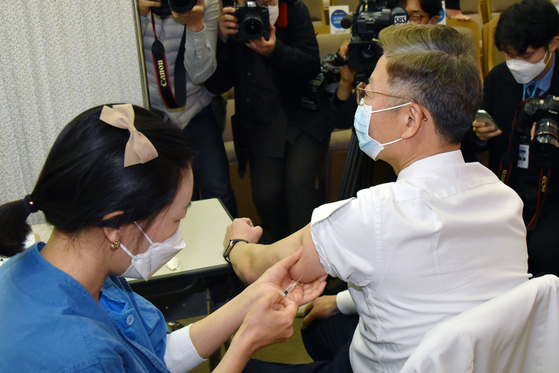![On the 4th, Kim Yeon-soo, head of Seoul National University Hospital, is receiving the AstraZeneca vaccine at Seoul National University Hospital in Daehak-ro, Jongno-gu, Seoul. [사진공동취재단]](https://i0.wp.com/pds.joins.com/news/component/htmlphoto_mmdata/202103/25/81873ea8-3b2b-4c40-af99-2670f21887c7.jpg?w=560&ssl=1)
On the 4th, Kim Yeon-soo, head of Seoul National University Hospital, is receiving the AstraZeneca vaccine at Seoul National University Hospital in Daehak-ro, Jongno-gu, Seoul. [사진공동취재단]
The Wall Street Journal (WSJ) predicted that the pace of economic recovery may be slower as Asian countries such as Korea, which have been well known in the initial response to Corona 19, lag behind vaccination. This is because consumption recovery is slow due to prolonged distancing, and there may be a’policy lag’ with the US, which is leading the vaccination rate.
WSJ reported on the 24th (local time) in an article entitled’Slow-Vaccinating Asia Is Squandering Its Economic Advantages’ He pointed out that he is lagging behind in the immunity competition.
According to data from’ourworld in data’, a statistical website of Oxford University in the UK, the vaccination rate per 100 people in the United States was 38.34 in the United States and 13.59 in the European Union, compared to 5.76 in China. In Korea and Japan, 1.38 people and 0.55 people were each vaccinated per 100 people, which was lower than this.
In response to this phenomenon, the WSJ interpreted that vaccination was not an urgent problem in these countries, where the corona19 mortality rate was low and economic damage was not significant. Therefore, unlike countries that paid attention to vaccine development and manufacturing, developed Asian countries were considered to have chosen to import vaccines.
He predicted that in the end, he would regret this choice. This is because it is difficult to alleviate social distancing or quarantine measures compared to countries that have reached collective immunity, which will eventually result in more economic burdens.
In particular, WSJ pointed to Korea as a’case that could fall into economic pitfalls’. Korea’s real gross domestic product (GDP) declined 1.2% between the end of 2019 and the end of 2020. Even in the corona 10 pandemic, WSJ points out that it is an optical illusion effect due to a 1.2% increase in exports, although it seems to have made good progress to the previous year’s level. In fact, during the same period, private consumption in Korea fell by 6.5%, worse than in the United States (-3.4%). WSJ predicts that at the current vaccination rate, Asian countries, including South Korea, will have social distancing and travel bans in the second half of this year and potentially beyond.
Another risk of delayed vaccination is capital outflows. This is a case in which fears of inflation become a reality as the economic recovery is accelerated by vaccinations in advanced western countries such as the United States. In this case, the United States and others may raise interest rates in order to control prices, but countries with relatively low recovery may have difficulty in shifting the base of interest rate policy. Because of this, it is analyzed that if the interest rate gap widens, funds could be drained from emerging countries to the US, and dollar-denominated debt could also cause significant economic damage to many Asian countries.
For this reason, WSJ predicted that “Asian countries, which were model countries in 2020, will eventually become envious of Western countries over time.”
Reporter Jeong Young-gyo [email protected]
![]()
